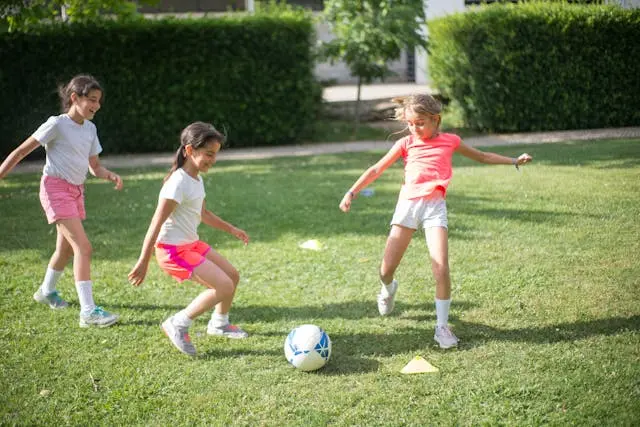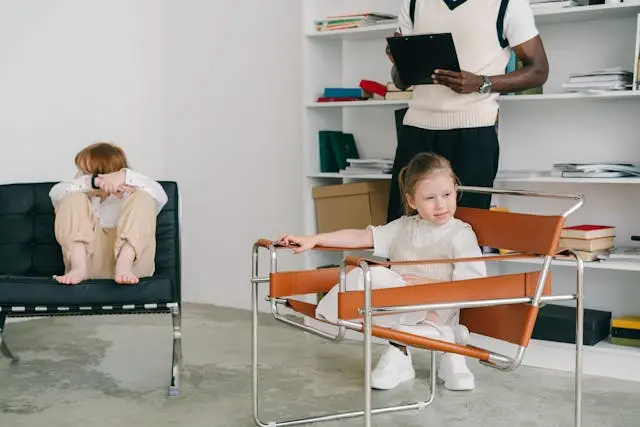Tips For Raising Children With High Self-Esteem
The article is developed in partnership with BetterHelp.
Most parents want to raise children who feel good about themselves. However, even when well-intentioned, many parents harm their child’s self-esteem by doing things like overpraising or criticizing.
By learning how to nurture your child’s self-esteem, you can help them feel accepted, proud, and confident.
What is self-esteem?
Self-esteem is how we perceive, appreciate, like, and value ourselves. It’s an internal sense that we create based on our beliefs about ourselves. In the face of challenging situations, our self-esteem predicts our ability to view ourselves favorably.
Indicators of healthy self-esteem include:
- Knowing your strengths
- Willingness to try things that are challenging
- Positive self-talk (i.e. saying “This might be hard, but I can do it,” versus “I can’t do anything.”)
- Loving and valuing yourself
- Understanding and communicating your needs
- Having healthy boundaries
Signs of low self-esteem include:
- Avoiding tasks out of the fear of failure
- Quitting things when they’re frustrating or challenging
- Lacking flexibility
- Making unhealthy relationship choices
- Not setting healthy boundaries, such as having a hard time saying “no”
- Socially withdrawn
- Self-critical comments, like “I’m dumb,” “I’ll never be good at this,” or “No one wants to be my friend”
- Focusing heavily on failures, instead of successes
A child’s self-esteem is affected by many things, including things no one has control over, like their personality traits, genetics, and age. But there are other things that impact self-esteem, including their home environment, sense of belonging, security, and self-confidence, which can be influenced by the way you parent.
How to build your child’s self-esteem
Self-esteem has an important influence on mental health, with studies revealing that high self-esteem has a protective effect against anxiety, depression, eating disorders, substance use disorders, and attention problems. For this reason, many parents actively try to help their children develop high self-esteem.
The following tools may help your child view themselves in a more positive light:
Encourage a growth mindset
A fixed mindset means that a person believes their abilities, value, and traits are unfixable. A growth mindset, on the other hand, means that a person believes they can improve their abilities with hard work. Children with a fixed mindset see failure as a fundamental flaw within themselves, whereas children with a growth mindset see failure as an opportunity to learn.
Helping your child develop a growth mindset means praising a child’s efforts, instead of their abilities.
If your child is disorganized and struggles with peer relationships and academic performance, it may be an indicator of ADHD (you can read more about whether you should get your child an ADHD assessment here: https://www.betterhelp.com/advice/adhd/how-can-i-get-an-adhd-assessment/). In these cases, it can be especially important to help them develop a growth mindset.
Make space for unstructured time
Many parents fill their children’s schedules with extracurricular activities and classes, but there are benefits of providing your child with some unstructured time, including its ability to boost their self-esteem. During unstructured time, your child will be able to exercise some control over what they want to do, practice problem-solving skills independently, and try new things without pressure.
Let them make their own decisions
Age-appropriate decision-making can help your child build their self-esteem. For example, this might include deciding what they want to wear, deciding what flavor of toothpaste they want, picking out their pajamas, or deciding what type of fruit they want to have at lunch.
Resist the temptation to overpraise
As surprising as it may sound, telling your child “You’re so smart,” or “Great job,” when they achieve a certain outcome may trigger anxiety, risk avoidance, and reduced self-confidence. Plus, when you constantly praise your child or tell them that they’re the best, they’ll realize that your compliments hold no weight. They become meaningless.
Instead, ensure your praise is genuine and specific. Ensure you mostly praise their efforts, rather than performance results (such as winning the game), or things they cannot change (like their physical appearance). For example, you might say something like:
- “I’m proud of you for practicing your instrument every day. You’re working really hard, and I can hear how much you’re improving!”
- “That’s an interesting painting. I like how you used a yellow background for the purple flower. Why’d you decide to do it like that?”
- “Your room is so neat and tidy now that you cleaned it up. I bet it’ll be much easier to find your things now. Thanks for doing that!”
You might also want to try covertly praising your child. For example, if your child can hear you from the other room while you’re talking on the phone with their grandparent, you might say something like, “I wish you could see how nicely Adam is collaborating on his school project. You’d be so proud of how kind and encouraging he is to his classmates.”
Don’t be critical
While overpraise can be harmful, it’s criticism that is usually more damaging for a child’s self-esteem. Criticism is inherently judgmental and has a tendency towards creating internalization, shame, and low self-esteem. Additionally, instead of addressing the problematic behavior, criticism tends to focus your child’s attention on your perception of them, and it degrades trust and bonding between parent and child.
Note that there is a difference between criticism and correction. For example, if you tell your child that taking things that don’t belong to them is wrong, and instruct them to return it and apologize, you’re correcting their behavior. In contrast, if you tell your child that they’re being a troublemaker or a thief, you’re criticizing them.
Let your child fail
Failure—whether it’s from not making the varsity soccer team or getting a poor grade on a test—is an opportunity to learn. When your child fails, remind them that you will always love them, regardless of their mistakes. And then, you can help guide them.
Perhaps they should prepare for the test further in advance, ask their teachers more questions, or try out for the varsity team instead. With practice and perseverance, they could try out for the varsity team the following year.
In other instances, you may be tempted to proactively protect your child from the experience of making a mistake. For example, if you see your child struggling to carry a large container of juice on their own at a catered event, you might want to interfere and help them before they spill it and embarrass themselves. Instead, see what happens when you don’t interfere.
Your child might spill the juice all over the floor, but then they may head over to a staff member, ask for towels, and then clean up their mess on their own. This experience could provide a far greater learning opportunity for your child than having you step in before they made a mistake.
Give them responsibilities around the house
Giving children some small household responsibilities, like feeding the pets or setting the dinner table, can give them the sense that they are an important member of the family. Acknowledging their efforts and explaining why it’s helpful (i.e. “By feeding the dog, you’re helping her grow big and strong”), can make children feel proud and accomplished.
Chore charts can be a useful way to chart their accomplishments and reward their positive behaviors with stickers, prizes, or allowances.
Takeaway
The term “self-esteem” encompasses how we value ourselves and whether we feel good about who we are. People with high self-esteem are more likely to have better relationships, less stress, greater work satisfaction, improved motivation, and overall better mental health outcomes than people with low self-esteem.
Parents can help their children develop high self-esteem by praising the process (not the outcome), letting children make their own decisions and mistakes, giving them age-appropriate responsibilities, and encouraging them to embrace challenges as an opportunity to get better.








